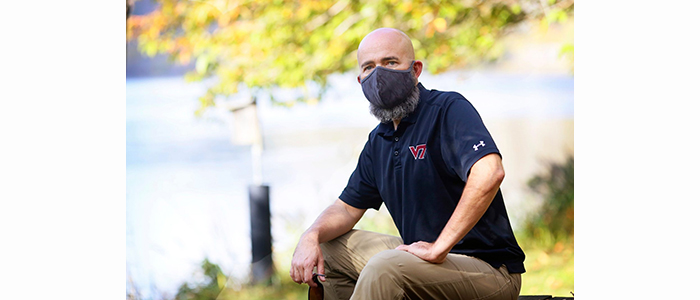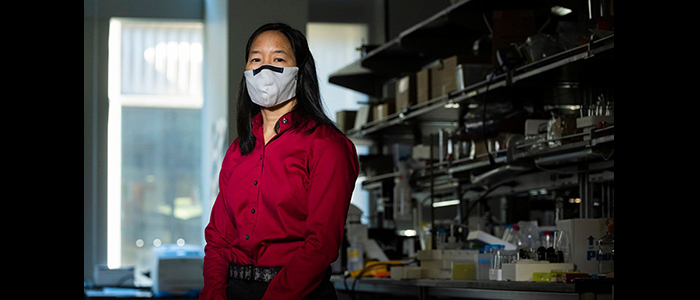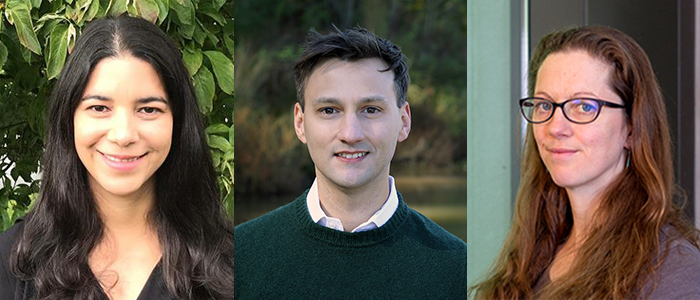[vc_row][vc_column][vc_column_text]
VT News | November 20, 2020
[/vc_column_text][vc_column_text]
At the edge of a retreating glacier, bedrock terrain that has been hidden under layers of ice is seeing light for the first time in several hundred years. On mountain peaks, trees experiencing warmer weather are gradually moving higher than established tree lines. Along Virginia’s coast, sea levels are rising by as much as 1 inch every four years.
These seemingly small changes to our landscapes are the frontiers where two faculty members in the College of Natural Resources and Environment’s Department of Geography are investigating how climate change will impact both the natural world and the communities where we live.
Climate challenges to coastal living
On our coasts, new lines of inquiry are also being fueled by and necessitated by climate change.
As sea levels rise and storms become more frequent and severe, there is an urgent need to understand community-scale responses to accelerating coastal risks. In Virginia, Assistant Professor and Global Change Center affiliate Anamaria Bukvic works with stakeholders to capture their experiences with coastal flooding and the ways they are coping with it, to better inform adaptation and resilience policies and programs.
“We are currently exploring the role of sense-of-place in a household’s decision to stay or move from a coastal community in response to flooding,” explained Bukvic, who teaches a course on the societal impacts of climate change. “We’re also investigating potential tipping points or cascading events on a community and household level that may lead to permanent relocation from flood-affected coastal locations.”
As a human geographer, Bukvic studies interactions between people and places using mixed methods, such as geospatial analysis, interviews, and surveys. She notes that the coronavirus pandemic has presented an obstacle in her efforts to interact with stakeholders.
“A significant portion of my work is done in person with communities and people,” she said. “When we learned this past spring that we could no longer collect data in person, we had to quickly adapt and move all of our primary data collection efforts to different modalities, like mail and online surveys and interviews via Zoom. The silver lining is that COVID-19 has inspired us to innovate and develop new and complementing ways to conduct our research.”
Bukvic further studies the impacts of recurrent or nuisance flooding on households’ decisions to consider relocation.
“While a majority of our respondents state it will take a big disaster like Katrina or Sandy to drive them away, smaller but frequent flood events can also serve as stressors that will gradually push people out of their communities,” she explained. “Even inconveniences like school delays and closures, longer commutes to work, and flooded parking lots can have a significant impact on people’s willingness to relocate.”
Bukvic, a Fellow with the National Center for Atmospheric Research’s Early Career Faculty Innovator Program and associate director of Virginia Tech’s Center for Coastal Studies housed in the Fralin Life Sciences Institute, notes that there are paralleling coastal challenges and responses to climate change threats across the world.
“We conducted a systematic literature review to identify which factors define sense-of-place in the context of natural hazards, disasters, and population mobility,” she said. “Based on our analysis, we developed a new measure of sense-of-place and applied it to rural and urban coastal case study locations in the U.S. and found that some considerations are remarkably similar across the globe. For example, people in rural areas generally have stronger attachments to their community due to greater social cohesion, connections to the land and natural environment, and their cultural identity.”
[/vc_column_text][vc_column_text]
Understanding emerging mountain ecosystems
Professor Lynn Resler researches high elevation ecosystems in North America, studying the dynamics that contribute to alpine tree line vegetation change. An ecological biogeographer, Resler examines current ecological processes taking place in remote locations.
“A lot of my work is predictive: I’m looking at what is happening right now and using that to understand what will happen in the future,” she said. “Understanding pattern-process relationships is key to figuring out how these ecosystems are going to be impacted by climate change.”
Resler, who has nearly 20 years of field experience working above the tree line in the Rocky Mountains as well as high elevation peaks in the Appalachian Mountains, has shown that vegetation characteristics in alpine environments are informed by a complex interplay between terrain topography and interactions taking place between plants and pathogens.
One example can be found in whitebark pine forests in the Rockies, where Resler and her collaborators provided crucial research on the spread of white pine blister rust, caused by an invasive fungal pathogen that moves from gooseberry or currant plants to white pines. While other studies suggested that high-altitude pines in cold, dry climates wouldn’t be affected by the fungus, Resler was able to document the spread of the blight above the tree line.
“Our findings led to a rich trajectory of research,” she noted. “Demonstrating that damage and mortality caused by blister rust inhibits the migration of whitepark pine means that we will see a change in the spatial pattern and function of tree lines throughout the Rockies.”
More recently, Resler, who teaches courses in biogeography and mountain geography, has been researching ecosystems that develop as land becomes exposed in the wake of glacier melt in Montana’s Glacier National Park.
“There is a great deal of research on the retreating of glaciers, but not as much on what is happening on the terrain that is exposed by that retreat,” she explained. “I’m looking at vegetation colonization processes at the forefront of glaciers.”
Resler noted that colonization of that new land is a slow process and one that is informed significantly by what kinds of rock exist underneath the ice.
“Geomorphic processes are an important bottleneck in plant succession in these places,” she said. “Plant colonization is very much tied to the nature of the underlying bedrock and glacial geomorphic processes that break down bedrock.”
Resler noted that on both mountaintop tree lines and glacier edges, climate models, while important, cannot alone predict what developing ecosystems will look like because many factors contribute to species range dynamics, including plant interactions, landscape processes, and invasive species.
“I think there’s an expectation that as glaciers retreat, the ecosystems that develop on newly exposed terrain will be the same as those that currently exist in the surrounding environments. But under changing climate scenarios, there are opportunities for new kinds of plants to colonize. The lags in colonization of surrounding plants are leaving space for invasive species to take hold and may alter the landscape significantly.”
Thinking broadly to meet a complex challenge
Both Bukvic and Resler recognize that the Department of Geography has a crucial role to play in bettering our understanding of the impacts of climate change in both the natural world and the human one.
“One of the advantages of the department is that it is highly interdisciplinary,” Bukvic explained. “We have the necessary skills and expertise to tackle emerging, complex issues, such as climate change and coastal resilience, across various physical and human dimensions.”
“Our students are increasingly aware of emerging climate change issues and are interested in finding solutions for some of the pressing challenges that are already affecting natural, built, and human coastal systems,” she continued. “We have a unique opportunity to shape a new workforce of geographers who are equipped with skills and knowledge to engage in a dialogue on coastal resilience and to actively influence the future of our coasts.”
Resler, who has led undergraduate and graduate students on research trips to Washington’s Cascade Mountains as well as study abroad experiences in Antarctica and New Zealand, notes that cultivating a sophisticated understanding of how various areas of research are interconnected is crucial for understanding climate change.
“I love to help students see the big picture, and field experiences are one of the best ways to achieve this goal,” she said. “I think it’s important to help them navigate broad-concept critical thinking while providing them with hands-on, course-relevant information.”
– Written by David Fleming
[/vc_column_text][vc_separator][vc_column_text]
CONTACT:
(540) 231-6157
[/vc_column_text][vc_separator style=”shadow”][/vc_column][/vc_row]








